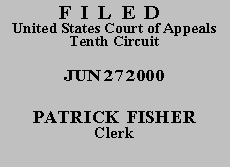

| MELANIE JO ANDERSON,
Plaintiff-Appellant, v. DILLON COMPANIES, INC., a Kansas corporation, doing business in Colorado as KING SOOPERS, INC., Defendant-Appellee. |
|
Plaintiff presents three issues for decision. Two issues challenge the district court's conclusions that plaintiff failed to demonstrate a genuine issue of material fact for trial concerning each of her Title VII claims. The third issue concerns an evidentiary matter, namely, exclusion of the opinion of plaintiff's psychological expert as evidence of the existence of a hostile work environment.
The standards of appellate review are well settled. We review a summary judgment decision de novo, applying the same legal standard used by the district court. Penry v. Federal Home Loan Bank, 155 F.3d 1257, 1261 (10th Cir. 1998), cert. denied, 526 U.S. 1039 (1999); Sprague v. Thorn Americas, Inc., 129 F.3d 1355, 1360 (10th Cir. 1997). A moving defendant is entitled to summary judgment if the factual record and inferences favorable to the plaintiff "could not lead a rational trier of fact to find for the [plaintiff]." Matsushita Elec. Indus. Co. v. Zenith Radio Corp., 475 U.S. 574, 587 (1986). If the plaintiff (who bears the burden of proof) lacks sufficient evidence on an essential element of a claim, then other factual issues concerning the claim are immaterial. Celotex Corp. v. Catrett, 477 U.S. 317, 322 (1986). We review evidentiary rulings for abuse of discretion. Wright-Simmons v. City of Oklahoma City, 155 F.3d 1264, 1268 (10th Cir. 1998). Applying these standards, we find no reversible error.
First, we have carefully reviewed the appellate record (including the telephone message that first troubled plaintiff) and find ourselves in complete agreement with the district court's decision to grant summary judgment on the sexual harassment claim. We cannot add significantly to the district court's thorough analysis of facts relevant to whether plaintiff was subjected to a hostile work environment. Simply stated, no rational juror could find that the incidents of which plaintiff complains were severe or pervasive enough "to create an objectively hostile or abusive work environment an environment that a reasonable person would find hostile or abusive . . . ." Harris v. Forklift Sys., Inc., 510 U.S. 17, 21 (1993). Factual issues argued by plaintiff regarding whether defendant properly investigated or appropriately responded to her harassment concerns relate to another element of this claim (employer liability for a hostile environment, see Baty v. Williamette Indus., Inc., 172 F.3d 1232, 1241-42 (10th Cir. 1999)) and are irrelevant to the dispositive issue.
Second, we find no abuse of discretion in the district court's ruling that the psychological expert's opinion was inadmissible to show that a hostile environment existed in plaintiff's workplace. In addition to reasons stated by the district court, with which we have no quarrel, the psychologist's affidavit and report are not probative of an objectively hostile work environment. The psychologist reported how the alleged harassment affected plaintiff and testified how a reasonable woman would be expected to react to the conduct that plaintiff had described. (Appellant's App. at 188-203, 205.) While the latter opinion suggests an objective view, it was based on incidents as related by and perceived by plaintiff. By relying on plaintiff's perception of things and incidents that plaintiff only heard about from others, the psychologist's opinion became skewed by its limited basis in plaintiff's subjective thinking, characterized by her own expert as "bizarre " (Appellant's App. at 197), and lost any probative force.
Finally, we also agree completely with the district court's analysis of the retaliation claim. A review of the record facts underlying this claim leads us to conclude, as did the district court, that no rational juror could find a causal connection between plaintiff's harassment complaints and any adverse employment action. Plaintiff points to purported delays in payment of accrued vacation and sick leave and disability benefits and a reported statement by her manager in connection with one of the delays, "Well, Melanie, this is what you get." (Appellant's App. at 211.) Viewed most favorably to plaintiff, this comment might raise an inference of a retaliatory motive for any adverse action to which it related. The record contains no indication, however, that the delay in vacation pay linked to the comment was such an adverse action. No fact is presented to show that plaintiff was entitled to be paid sooner; the record shows only that the check was not available on the day plaintiff had been told it would be.
We have reviewed the parties' summary judgment briefs, the magistrate judge's recommendation, plaintiff's objections to it, the district court's decision, the parties' appellate briefs, and the relevant record. Finding no error, we affirm for substantially the same reasons stated in the district court's May 27, 1999 Memorandum Opinion and Order.
The judgment of the district court is AFFIRMED.
ENTERED FOR THE COURT
Wayne E. Alley
Senior District Judge
*. This order and judgment is not binding precedent, except under the doctrines of law of the case, res judicata, and collateral estoppel. The court generally disfavors the citation of orders and judgments; nevertheless, an order and judgment may be cited under the terms and conditions of 10th Cir. R. 36.3.
**. The Honorable Wayne E. Alley, Senior District Judge, United States District Court for the Western District of Oklahoma, sitting by designation.